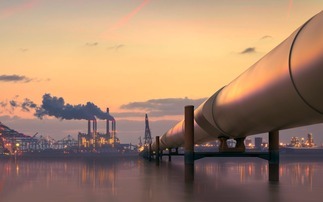Mark Elliott explains how a role caring for one of the UK's only beaver families highlights the growing opportunities the conservation sector can offer
"The impact that beavers have is like nothing else," says Mark Elliott. "They transform a landscape. It's so dramatic. Seeing the way they transform wetlands is incredible."
Elliott is the leader of the Devon Wildlife Trust's Beaver Project. Since 2010, he has been involved with the plans to reintroduce this big, charismatic species to England.
There are now two groups of beavers in Devon; a family in an enclosed area in the west of the county, introduced in 2011, and a group in the River Otter, who have been there since 2015. Mark was heavily involved in both. "Although the wildlife in wetlands is what excites me," he says, "seeing the benefits beavers provide to people is really key."
The job, he says, is largely one of communication. Beavers have an extraordinary positive impact on the local environment - their dams improve water quality, provide habitats for a huge range of species, and best of all reduce flooding for human communities downstream. The pools and wetlands their dams create hold water, releasing it slowly, so in periods of heavy rain they reduce the peak flow.
But that's not always understood by local people, especially in some farming communities, where people worry about the pools taking up their land, and among anglers who (erroneously) fear the beavers will eat fish. There haven't been beavers in England for 400 years, and people have forgotten what it is like to live with these vital, landscape-changing, and yes, vegetarian, creatures.
"The main skill is understanding the science," says Elliott, "and then communicating it. Making people understand what beavers do and don't do. There's a lot of myth-busting." And it is not limited to correctly misconceptions about beaver's diets. "Beavers are a keystone species," Elliott continues. "They engineer their environment, and that brings them into conflict with people. The job is about finding a way through that, so people can accept them into their landscape."
As such, he often finds himself at village halls, talking to local people about their concerns. "Their concerns are real, and can't be dismissed," he says. "But I enjoy a good robust public discussion."
Elliott has a wetland ecology background - he did a degree in the subject at Aberystwyth University in the 1990s, and has worked in conservation ever since, including jobs at the Environment Agency, West Sussex County Council, and the Sussex Wildlife Trust. Work in ecology and conservation, he says, has to be a calling, not simply a job. "You need to be out there at weekends, volunteering with local wildlife trusts," he says. "It's a way of life. To stand out, you've got to demonstrate that it's a passion. It's easy to spot, when you're recruiting, who has that passion."
Beavers aren't about to make a rapid return to every waterway in the country, but they are indicative of the changes currently underway in the conservation sector. In recent years attention has shifted, sometimes controversially, from a traditional approach to simply protecting existing species and habitats to a more business-focused requirement to deliver so-called 'ecosystem services' or maximise 'natural capital'. Meanwhile, the fledgling rewilding movement has provided a rallying point for many conservationists, highlighting how landscapes can be restored and species reintroduced in a way that delivers multiple benefits, such as increased tourism, carbon abatement, and flood protection.
Hopes are growing that this trend could soon be turbo-charged, after Environment Secretary Michael Gove kicked off plans for a 'Green Brexit' that centre on subsidising farmers and landowners to deliver a range of environmental benefits. He also approved the introduction of more beavers into Gloucestershire, which happened earlier this year.
Like many environmentalists Elliott is cautiously optimistic about the planned reforms, arguing that while "it's too early to say" whether they will deliver on their promise "the government does seem to be listening, and understanding the benefits that storing water in the landscape provides".
"But it remains to be seen whether the support system for farmers that comes in after Brexit, the agricultural subsidies that come in after 2022, adequately incentivise farmers to provide these wetland habitats," he adds. "It's key that we ensure landowners are being properly supported for these benefits they could provide, but we're not there yet."
That support is likely to include ensuring farmers and landowners have access to the skilled experts necessary to ensure promised environmental improvements are delivered in a responsuible and effective fashion. "It could be a real boost for this work," Elliott says of the planned changes, which are expected to be included in the upcoming Agriculture Bill. "Our water courses need more space - they're too squeezed by agriculture. A really good thing that could happen is a simple payment for providing a decent barrier along watercourses."
The hope is that the changes reverse worrying trends for both biodiversity and the conservation sector. "When I started doing it in the 1990s, the sector was growing year-on-year," says Elliott. "But over the last five years things have tailed off. [There is] much less money around for projects, organisations slimming down. The jobs market is becoming more competitive."
Partly, he says, that's because biodiversity - the central goal of conservation and ecology - is not always seen as a high priority. "A lot of the green economy is about carbon, and that's fair enough," he says. "That is fundamental. But biodiversity is not as high a priority as it should be."
The hope is the combination of agricultural subsidy reforms, the growing recognition that negative emissions techniques are critical to the development of a net zero emission economy, and increasing public attention on the loss of biodiversity could quickly lead to a change in fortunes for the sector.
It is a hope Elliott ascribes to. Wetlands' ability to store carbon is one reason. But also, the reintroductions of big keystone species - beavers and, perhaps one day, lynx - have captured public imagination.
"Within the conservation sector, reintroductions aren't seen as a high priority," Elliott admits. "People are trying to hold on to the species we've got. But there's a lot of interest among the general public.
"It's important that we don't prioritise reintroduction over other species. But that's why beavers are so exciting, because they create habitats for other species - it's not an either/or, it's a tool for restoring habitats."
The BusinessGreen Future Jobs Hub is supported by Green GB Week










